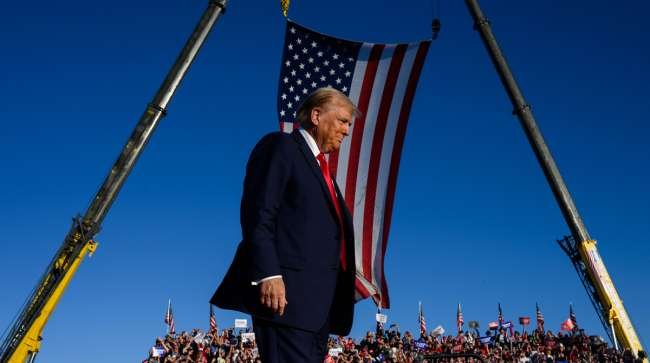US-EU Trade War: Tensions Escalate as Europe Readies Retaliation Against Trump’s Tariff Plans
The simmering trade dispute between the United States and the European Union is on the verge of turning into a full-blown conflict. Analysts are warning that Donald Trump’s latest moves to impose sweeping tariffs could spark a fierce retaliatory response from Brussels, setting the stage for a significant escalation in tensions. As President Trump pushes forward with aggressive trade policies, many are speculating that the trade war could soon “get nasty,” with dire economic consequences for both sides.
A Brewing Storm: The Latest US Tariff Plans
President Donald Trump, known for his “America First” policies, has made it clear that he intends to continue pushing forward with his controversial trade agenda. In recent weeks, Trump confirmed plans to impose blanket tariffs of 25% on steel and aluminum imports, including those from the European Union. His rhetoric has consistently underscored the notion that the EU’s trade practices are inherently unfair to American businesses, particularly in sectors like automobiles and agricultural products.
“Europe doesn’t take our cars, they don’t take our farm products. They take almost nothing, and we take everything from them,” Trump has argued in previous statements. His administration’s justification for these tariffs stems from the claim that the EU maintains trade barriers that harm American workers and industries.
Yet, Trump’s latest tariff move goes beyond steel and aluminum. The former president has also hinted at the possibility of more aggressive tariff hikes, signaling that his administration will continue its “reciprocal tariff” strategy. Under this plan, the U.S. would impose tariffs equivalent to those levied on American products by other countries, including the EU. The broader goal appears to be leveling the playing field for U.S. exporters, but the repercussions could significantly disrupt European industries that rely on exports to the United States.
Europe’s Response: Retaliation on the Horizon
The European Union has been vocal in its opposition to Trump’s tariff plans, warning that any further U.S. action will prompt swift and forceful retaliation. Brussels has made it clear that it will not allow these tariffs to go unanswered, stating that it is committed to protecting the interests of European businesses, workers, and consumers. The European Commission, which is responsible for managing trade relations within the EU, has reiterated that there is no justification for the imposition of tariffs on European exports.
“We will react to protect European businesses, workers, and consumers from unjustified measures,” the European Commission said in an official statement. Commission President Ursula von der Leyen reinforced this stance, declaring that any tariffs imposed on the EU would trigger “firm and proportionate countermeasures.” Von der Leyen’s words signal that Europe is prepared to stand its ground, and that retaliation will not be an idle threat.
Chancellor Olaf Scholz of Germany, a key EU member state, also echoed this warning. Scholz emphasized that the EU would not simply accept new tariffs without a response. “Anyone who imposes tariffs must expect counter-tariffs,” he stated, underscoring the EU’s position that further escalation of trade tensions will lead to serious consequences.
The Potential Fallout of an Escalating Trade War

The repercussions of a U.S.-EU trade war are far-reaching, with the potential to disrupt supply chains and increase costs for businesses on both sides of the Atlantic. The proposed steel and aluminum tariffs are just the tip of the iceberg. If Trump follows through with additional tariffs, European manufacturers may be forced to absorb higher costs for raw materials, which could translate into higher prices for consumers and a slowdown in production. This, in turn, could lead to job losses and broader economic slowdowns in key sectors.
European industries that rely heavily on exports to the United States, such as automotive manufacturing, technology, and pharmaceuticals, could find themselves caught in the crossfire. Many European companies depend on access to the lucrative U.S. market, and the imposition of tariffs could jeopardize their competitiveness. In response, European businesses may look to diversify their supply chains and seek new markets, which could further erode the economic ties between the U.S. and the EU.
On the U.S. side, the imposition of tariffs could provoke similar consequences. While Trump has framed his tariffs as a way to protect American jobs, some economists argue that the long-term effects could be detrimental to the U.S. economy. Higher costs for imported goods may lead to inflationary pressures, increasing prices for American consumers. Additionally, retaliatory tariffs imposed by the EU could hurt U.S. exporters, particularly in industries such as agriculture, where Europe is a major market for American farm products.
The possibility of a full-scale trade war between the U.S. and the EU could also strain diplomatic relations between the two global economic powers. Historically, the U.S. and the EU have enjoyed a strong economic partnership, with shared interests in fostering global trade and addressing issues like climate change, cybersecurity, and geopolitical tensions. A breakdown in trade relations could make it more difficult for both parties to collaborate on these pressing issues, further compounding the challenges of global governance.
A Global Economic Challenge
Beyond the immediate effects on U.S.-EU relations, the escalating trade war could have ripple effects throughout the global economy. A significant disruption in trade between two of the world’s largest economic blocs could lead to a contraction in global trade flows, affecting countries and industries that depend on the EU and the U.S. as major trading partners. Emerging economies, in particular, could feel the strain as supply chains are disrupted and global demand weakens.
Furthermore, the rise of protectionist policies could undermine the principles of free trade that have been central to the global economic order for decades. As countries like the U.S. and the EU impose tariffs on one another, other nations may follow suit, leading to a rise in trade barriers worldwide. This trend could slow global economic growth and increase uncertainty in international markets.
The Way Forward: Is There Room for Compromise?
Despite the heated rhetoric on both sides, there may still be room for negotiation. Both the U.S. and the EU have indicated a willingness to engage in discussions to resolve their trade differences, though the path to compromise may be long and fraught with challenges.
For the EU, the primary goal is to protect its economic interests while maintaining its commitment to multilateral trade agreements. The European Commission has emphasized the importance of diplomacy and dialogue in addressing trade issues, calling for the U.S. to engage in discussions aimed at finding mutually beneficial solutions. On the U.S. side, while Trump’s stance on trade remains firm, the potential for diplomatic efforts to ease tensions should not be entirely ruled out.
In the end, both the U.S. and the EU may need to make difficult concessions if they are to avoid further escalation of this trade conflict. Whether through negotiations or additional rounds of retaliatory measures, the coming months will be critical in determining the future of transatlantic trade relations.
Conclusion
As the trade war between the United States and the European Union intensifies, the stakes could not be higher. With both sides preparing for a tough and protracted conflict, the global economy stands at a crossroads. While the immediate effects of these tariffs may be felt most acutely in the U.S. and EU, the reverberations of this trade dispute will likely be felt worldwide. The question remains: Can the U.S. and the EU find common ground, or will their rivalry ignite a broader global trade conflict? Only time will tell.
This revision is tailored to enhance SEO and readability while providing a comprehensive overview of the ongoing trade tensions between the U.S. and the EU. Let me know if you need further changes!














Post Comment